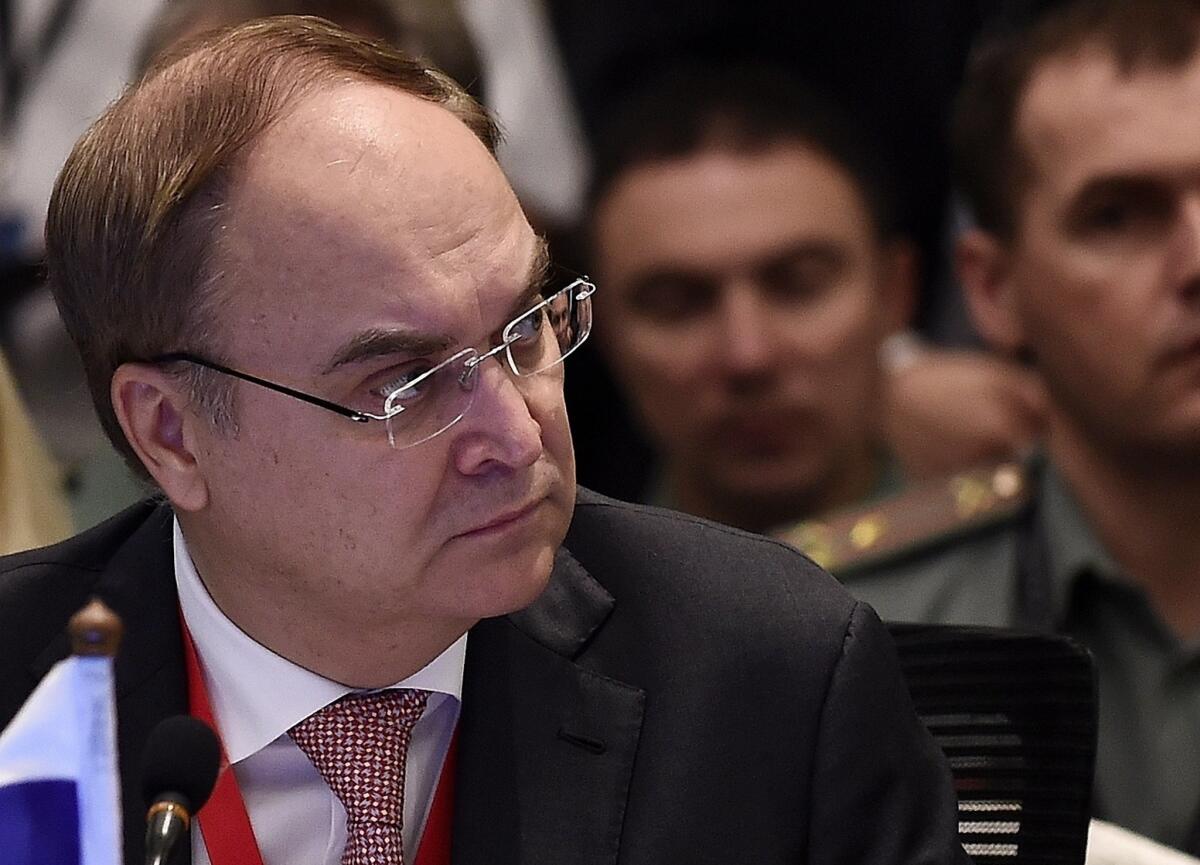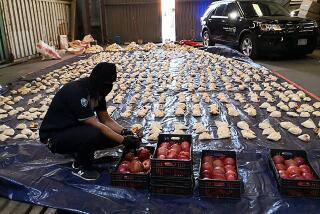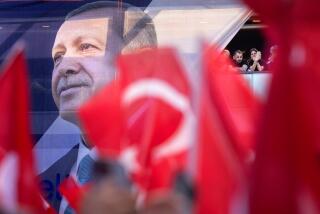Russia accuses Turkish president of benefiting from oil trade with Islamic State

Russian Deputy Defense Minister Anatoly Antonov said Russia has evidence showing that Turkish President Recep Tayyip Erdogan and his family were linked to the Islamic State oil trade.
- Share via
Reporting from Beirut and Moscow — Russian military officials Wednesday accused the Turkish president and his family of involvement in illegal oil trade with Islamic State extremists, the latest salvo in a war of words since Turkey’s shoot-down of a Russian warplane last week.
Russian Deputy Defense Minister Anatoly Antonov charged that Turkey was the “chief consumer” of oil smuggled out of Iraq and Syria, with revenues reaching about $2 billion per year.
“According to our information, this criminal business involves [Turkish] President [Recep Tayyip] Erdogan and his family,” Antonov said during a televised news conference in Moscow.
NEWSLETTER: Get the day’s top headlines from Times Editor Davan Maharaj >>
Erdogan dismissed the allegation as “baseless,” in a speech at Qatar University in the Qatari capital, Doha, Wednesday, according to Turkish newspaper Daily Sabah. Erdogan reiterated his vow to resign if incontrovertible proof was given, adding that “Turkey is not so dishonorable as to buy oil from a terrorist organization.”
U.S. officials were skeptical of Russian claims. Russia may be trying to embarrass Erdogan’s government, two U.S. officials said, in retaliation for Turkey’s shoot-down of a Russian fighter jet that Turkish officials say crossed into their airspace on Nov. 24. The officials spoke on condition of anonymity to discuss internal assessments.
The Syrian government led by President Bashar Assad, which Russia supports, is the largest consumer of Islamic State’s oil production, White House spokesman Josh Earnest said.
“The irony of the Russians raising this concern is that there’s plenty of evidence to indicate that the largest consumer of ISIL oil is actually Bashar Assad and his regime, a regime that only remains in place because it is being propped up by the Russians,” Earnest told reporters, using an acronym for Islamic State.
The Pentagon flatly rejected the allegation that Turkey’s leaders and government are secretly working with Islamic State and profiting from the black market trade, according to Col. Steve Warren, spokesman for the U.S.-led coalition against Islamic State.
The Russian accusations come amid increased scrutiny on how Islamic State has continued to produce and sell oil.
Many analysts say oil is the lifeblood of Islamic State’s fledgling caliphate, enabling it to wage war against its enemies while providing services and benefits to those who live under its rule, despite a concerted U.S.-led coalition airstrike campaign against refineries and tankers in territories controlled by the group.
The reason this network continues to function, analysts contend, is its reliance on third parties - many with no connection to the extremist group.
“Civilians are the main implementers of the oil sector inside the caliphate. They are the ones who do the refining, the bulk of the transporting and the trading,” Patrick Osgood, an analyst with Iraq Oil Report, said in a phone interview from London. “The Islamic State controls, documents and regulates the processes it has with these third parties.”
Aymenn Tamimi, an analyst who has access to a trove of Islamic State administrative documents, said expectations are far different depending on whether one is buying oil from Islamic State or investing in the group.
“Oil fields are owned by the Islamic State and whoever invests in them must have pledged allegiance to the group, but buyers from the fields, refiners and truckers don’t need to have it,” Tamimi said via chat on social media.
This allows people to buy the oil from Islamic State fields, and “truck it even to the U.S. if they liked,” Tamimi said. But it also allows the network to be resilient, because the Islamic State “apportions affiliation in the oil industry so that it is not forced to compensate for trucks and refineries that are targeted.”
Sales are administered by the “Oil Section” of Islamic State’s Diwan Al-Rikaz [Office of Ground Resources], which handles “the mechanism of buying and selling oil derivatives inside the land of the caliphate,” according to a report issued on social media last June by Omar Fawaz, a pro-Islamic State engineer who said he was based in the Iraqi city of Mosul.
Islamic State wrested control of Mosul last year during a stunning assault that saw the extremists take over large parts of oil-rich territories in Iraq and Syria.
An added windfall, according to Osgood, came from large reservoirs of oil in storage units and stricken pipelines meant to serve Iraq’s extensive oil industry.
“They were able to sell this through pre-existing mafias in place since before the U.S. invasion of Iraq in 2003, but which have since been shut down,” Osgood said.
Receipts obtained by Tamimi show Diwan Al-Rikaz transactions from this year selling oil to small-time unaffiliated refiners, many of whom are locals desperate to eke out a living from what oil derivatives they can produce.
Many refiners rely on primitive burners. Dotting the landscape in areas near the Syrian border, they spew toxic smoke into the air, blackening the ground in the perimeter of the refinery and poisoning groundwater in the area.
Once refined, much of the oil is used for internal consumption, transported to gas stations and makeshift stands selling gasoline on the side of the road in Islamic State territories. Even here, Diwan Al-Rikaz generates income by auctioning off the right to operate the gas stations.
Another portion is sold to middlemen, either from the Syrian government or from rebel groups, Tamimi said.
Russian Lt. Gen. Sergei Rudskoy on Wednesday identified three routes of oil from Syria fanning out to rebel-held towns along the Syrian-Turkish border such as Azaz before heading to Turkish ports or refineries. Rudskoy showed satellite images depicting thousands of trucks moving along the routes. The images, however, did not distinguish between trucks carrying oil and those carrying food and other goods.
Both analysts dismissed the Russian claims, saying that they did not place enough emphasis on domestic consumption for Islamic State.
Tamimi questioned the importance of oil to the Islamic State’s finances. He cited a report from the Islamic State’s Bayt Al-Mal [analogous to a Finance Ministry] accounting for income last February from Syria’s eastern province of Dair Alzour, an oil hub.
It showed that total oil revenues amounted to slightly less than $2 million per month, a far cry from the Russians’ claim of $3 million per day (a number which Antonov claimed was halved after two months of Russian airstrikes).
It was also eclipsed by other income streams, such as confiscation of property and money.
“Oil is a driver of the Islamic State,” said Tamimi, “but not the mainstay.”
Special correspondents Bulos and Mirovalev reported from Beirut and Moscow. Times staff writers Brian Bennett and W.J. Hennigan in Washington contributed to this report.
ALSO
British Parliament to vote on expanded attacks on Islamic State
Japan probes mystery boats carrying decomposing bodies drifting off its coast
Jerry Brown sees religion in the science of climate change
More to Read
Sign up for Essential California
The most important California stories and recommendations in your inbox every morning.
You may occasionally receive promotional content from the Los Angeles Times.











